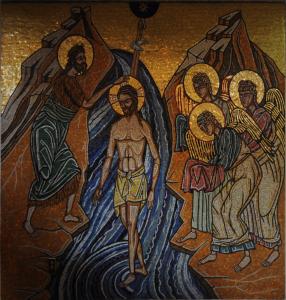
One famous heresy, popular especially at the inception of the Christian faith, is that of Adoptionism. It taught that Jesus was made the adopted Son of God the Father. Because the implications of that teaching, and the time in which Jesus was said to become adopted by God (such as at his baptism, resurrection, or his ascension), there were various different forms of the heresy, but that does not mean they did not hold enough in common for them to be rejected by the same principles. For, it is clear, Adoptionism denied Jesus was the begotten Son of God; nonetheless, because God chose him and adopted him, they did believe he was transformed in such a way that he could be said to have become God. What they meant by that could be debated, but it is clear, they denied the eternity of the Son of God; Jesus was not a divine person who was eternally with the Father, begotten by the Father before all ages, but rather, Jesus was a human person whom God made into the Son of God. Thus, Adoptionism denies the traditional teaching of the Trinity, and with it, also the teaching of the hypostatic union (because there was no need to explain how a divine person could and would assume human nature, for what they taught is Jesus was first a human person who was then made into the Son of God).
Especially as it was being taught when Christians were developing the tools they needed to discuss who they believed Jesus to be, it is easy to see how and why some believers would have been drawn to the Adoptionist viewpoint. For it gives a simple, easy to follow description of who Jesus is, and it could also be seen as given a way to understand why Jesus felt it necessary to be baptized. For, if one followed the belief that Jesus’ adoption by God was done at his baptism, then it is easy to see that what was revealed in his baptism was when God chose Jesus and elevated him to his new status:
Then Jesus came from Galilee to the Jordan to John, to be baptized by him. John would have prevented him, saying, “I need to be baptized by you, and do you come to me?” But Jesus answered him, “Let it be so now; for thus it is fitting for us to fulfil all righteousness.” Then he consented. And when Jesus was baptized, he went up immediately from the water, and behold, the heavens were opened and he saw the Spirit of God descending like a dove, and alighting on him; and lo, a voice from heaven, saying, “This is my beloved Son, with whom I am well pleased” (Matt. 3:13-17 RSV).
Now, while the simple reading might give us some sense to this passage, too many other questions arise, explaining why that reading cannot be and is not said to be the authentic Christian understanding of Jesus’ baptism. For example, it really does not explain why God chose Jesus instead of someone else, like John the Baptist. Secondly, it raises the question of how this adoption makes Jesus capable of saving the world. Third, we can and should ask, is only Jesus going to become an adopted child of God, or are we all called to such a status, and if we are all called to it, what, then, truly distinguishes him from us? For his humanity is the same as our humanity, and so there is something to be said about our equality with him, thanks to the way we share our human nature with him. However, traditional theology, while affirming that equality in our shared human nature, is able to distinguish him from the rest of us in relation to who he is as a person: he is a divine person, not a human person, and it is through his status as a divine person he is truly said to be the Son of God. Thus, the Christian tradition, following clues in Scripture, says Jesus is not just an adopted child of God, but that he is the only-begotten Son of the Father (cf. Jn. 3:16). The Father did not beget the Son at the baptism, but rather, as God is eternal, and unchanging, so the begetting of the Son is an eternal and an unchanging reality. The Son is eternal with the Father, and this is what the Father was revealing to us at Jesus’ baptism.
Jesus’ baptism, therefore, is not about making him the Son, but about revealing to us that he is the Son, even as it is also the revelation of the reality of the Trinity, was in it, we also discern the Father and the Holy Spirit. His baptism is also more than just about the revelation of the Trinity. It is also about the descent of the Holy Spirit upon him in and through his humanity, and through that descent, the establishment of a new relationship of the Holy Spirit with the rest of the world. Through Jesus, the Holy Spirit is now sent into the world to enlighten it and make it holy, giving it and those within it, the gifts and treasures it needs for holiness and beatitude. And so, by coming upon the humanity of Christ, Jesus now acts as the go-between for the Spirit and the rest of creation, and those who want to receive the fullness of the Spirit for themselves must find a way to share in and experience it through their unity with Jesus. Yes, the Holy Spirit does go abroad and call people to receive its blessings, sharing elements with them as needed, but all those elements help bring people together and become one with another, and in that unity, one with Christ so as to receive all the blessings of the Spirit. We are called to receive the fullness of the Spirit in ourselves, and when we do so, we will find ourselves becoming partakers of the divine. With this, we should be able to discern the difference between Jesus and us: Jesus, as a divine person, has an eternal relationship with the Spirit, even as he has one with the Father, and so for him that relationship has no beginning nor end, while for us, it is something which has a beginning, even if, hopefully, it will have no end. It is because we become united with Jesus that we, in and through that unity, find ourselves becoming adopted children of God – “but when the goodness and loving kindness of God our Savior appeared, he saved us, not because of deeds done by us in righteousness, but in virtue of his own mercy, by the washing of regeneration and renewal in the Holy Spirit, which he poured out upon us richly through Jesus Christ our Savior, so that we might be justified by his grace and become heirs in hope of eternal life” (Tit. 3:4-7 RSV). We are heirs, not because we are, like Jesus, eternally begotten of the Father, but because God has opened up and made room for us in the divine life as adopted children of God. And this means, we receive our place in the divine life through grace, a grace we receive in our unity with Jesus, a unity which does not destroy us as a person but rather, affirms our personhood, even as Jesus’ distinct divine personhood remains after the incarnation.
While Adoptionism deals with themes which are legitimate, those themes are misconstrued by it. Instead of seeing Jesus as the adopted Son of God, we must understand that we are the ones who become adopted children of God, and through that adoption, find ourselves being deified. Jesus, as the Son of God, is a divine person with a divine nature, and so is God by nature, which is why he is not merely made into a God. We, on the other hand, participate in and experience the divine nature through grace. The divinity is not ours by nature, nor is it something who we are in accordance to our personal identity. It is something which we share in and experience thanks to grace. That is, grace is the means of our adoption into children of God; Jesus is the one who gives us that grace. Jesus is the Son of God, not just someone chosen by the Father to participate in and experience the divine nature. Jesus is shown at his baptism to be the Son, but the Son who assumed humanity in order to save and deify the world. In his baptism, we the see Trinity it at work, making sure that happens.
Stay in touch! Like A Little Bit of Nothing on Facebook.
If you liked what you read, please consider sharing it with your friends and family!
N.B.: While I read comments to moderate them, I rarely respond to them. If I don’t respond to your comment directly, don’t assume I am unthankful for it. I appreciate it. But I want readers to feel free to ask questions, and hopefully, dialogue with each other. I have shared what I wanted to say, though some responses will get a brief reply by me, or, if I find it interesting and something I can engage fully, as the foundation for another post. I have had many posts inspired or improved upon thanks to my readers.













